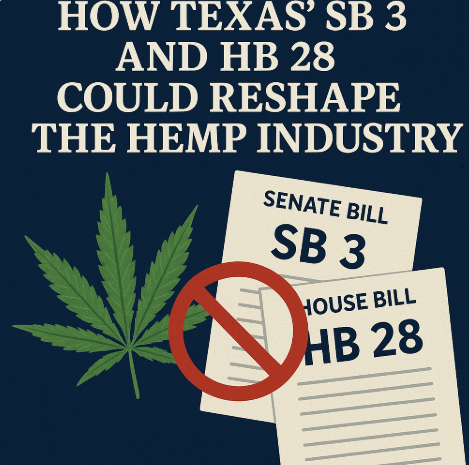
How Texas’ SB 3 and HB 28 Could Reshape the Hemp Industry
The Texas hemp industry is bracing for significant changes as two legislative bills—SB 3 and HB 28—take center stage. These proposed laws have the potential to transform the hemp landscape in Texas, affecting producers, retailers, and consumers alike. If passed, they could drastically limit the types of hemp products available and impose new regulatory hurdles, threatening the livelihoods of many small businesses and deterring cannabis advocates.
This blog will break down the key elements of SB 3 and HB 28, outline their potential impacts on the hemp and cannabis industry, and provide steps on how businesses and advocates can take action to protect their interests.
Understanding SB 3 and Its Implications
What is SB 3?
Scheduled for a committee hearing in the Texas House on Monday, April 7, SB 3 introduces heavy restrictions on hemp products. The bill proposes a ban on all cannabinoids except for CBD and CBG isolates. While CBD and CBG are widely recognized for their health benefits, cannabinoids like Delta-8 THC, THCV, and others, which make up a significant share of the hemp market, would no longer be permitted.
This change is nothing short of drastic. If SB 3 becomes law, it would effectively eliminate 90–95% of the hemp product marketplace in Texas. From tinctures and edibles to topicals and smokable hemp, the diversity of products consumers currently enjoy would vanish overnight.
Why Should This Matter to You?
For hemp businesses, this bill could result in massive financial losses. Retailers would see inventories shrink, while manufacturers would have to pivot to producing only CBD and CBG products—narrowing their innovation pipeline. For consumers, the options for personalized wellness solutions would be critically reduced, impacting individuals who rely on other cannabinoids for their health and well-being.
Advocates argue that SB 3 doesn't just hurt businesses but also represents a significant step backward in cannabis policy. By singling out only a small portion of the hemp plant's beneficial compounds, the legislation ignores the broader potential of hemp as a holistic and versatile product.
The Controversies Surrounding HB 28
What is HB 28?
HB 28, backed by the Texas Package Stores Association, zeroes in on the distribution of hemp products—specifically beverages infused with hemp-derived THC. The bill proposes transferring the regulatory authority over these products to the Texas Alcoholic Beverage Commission (TABC). If enacted, HB 28 would classify THC beverages under the same restrictive three-tier system that governs liquor distribution.
Additionally, HB 28 introduces a provision to criminalize direct-to-consumer sales of hemp products. Under this change, consumers would no longer be able to purchase hemp products online and have them shipped directly to their homes—a convenience that many businesses rely on to reach their customer base.
How Does HB 28 Impact Businesses and Consumers?
For businesses offering hemp-infused beverages, HB 28 would introduce significant regulatory burdens. The three-tier system would require producers and retailers to go through distributors to sell THC beverages, likely increasing costs while also reducing efficiency and control.
Criminalizing direct-to-consumer sales further complicates matters. Hemp businesses that depend on e-commerce channels to capture a broader audience beyond physical retail locations will face a loss of revenue streams. For consumers, this means fewer options, higher prices, and less access to innovative products.
The Bigger Picture
The introduction of these bills comes at a pivotal moment for Texas' cannabis industry. For years, Texas has been viewed as a challenging environment for hemp businesses due to restrictive policies and limited support for the broader cannabis market. SB 3 and HB 28 represent escalations in this long-standing tug-of-war between advocates of cannabis accessibility and those pushing for tighter regulation.
These bills have broader implications beyond Texas. If they pass, they could serve as a precedent for other states exploring similar restrictive measures, potentially stifling the growth of the hemp and cannabis industries nationwide.
What Can You Do?
Take Action
If you're a hemp business owner, cannabis advocate, or supporter of consumer choice, now is the time to act. Here's how you can make a difference:
-
Contact Texas Legislators: Reach out to members of the Texas House and Senate to express your concerns about SB 3 and HB 28. Personal stories from consumers and businesses can be especially impactful.
-
Join Advocacy Groups: Organizations like the Texas Cannabis Collective or the Hemp Industry Association are rallying efforts to oppose these bills. Joining their campaigns can amplify your voice.
-
Educate Your Customers: If you're a retailer, inform your customers about the potential impact of SB 3 and HB 28. Encourage them to contact their local representatives and join the fight for hemp accessibility.
-
Partner with Industry Peers: Collaboration among hemp businesses will be crucial in advocating for policy that strikes a balance between regulation and innovation. Work together to create a unified front.
Stay Updated
Keeping informed about the legislative process is critical. Monitor updates from trusted industry organizations and news outlets, and be prepared to adapt your business model as new developments unfold.
Will Hemp Thrive or Survive in Texas?
While hemp has historically carved out a resilient niche in Texas, the combined threats posed by SB 3 and HB 28 could fundamentally alter this landscape. For businesses and advocates, these proposed changes mean they must band together like never before to protect the industry and preserve access for consumers.
The future of cannabis policy in Texas will have ripple effects across the country. It's essential for stakeholders to remain engaged, vocal, and proactive to ensure that innovation and accessibility are not sacrificed in the name of restrictive regulation.
Want to stay in the loop with actionable tips for navigating changing cannabis policies? Sign up for our newsletter. Together, we can help the hemp industry thrive in Texas and beyond.



